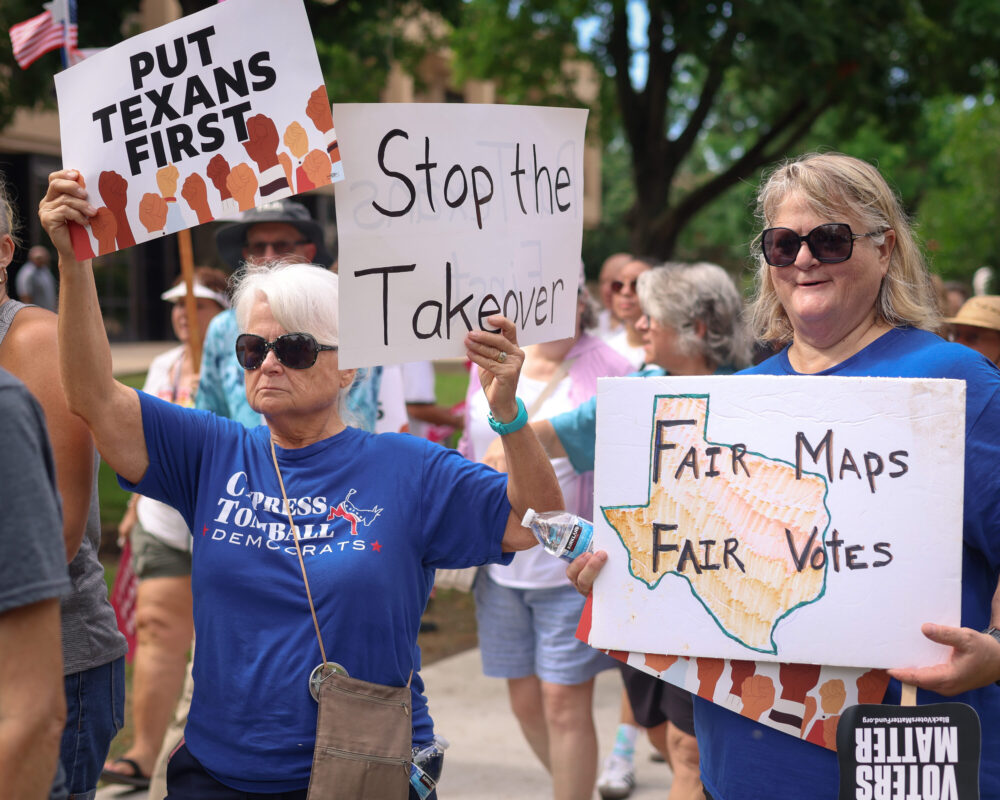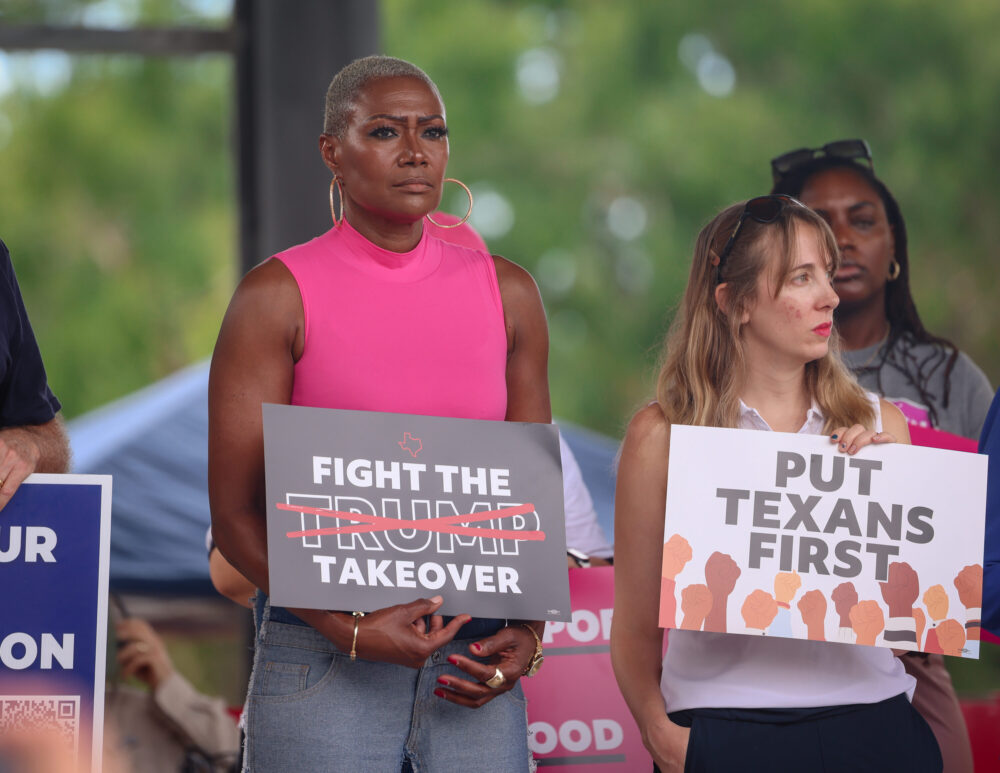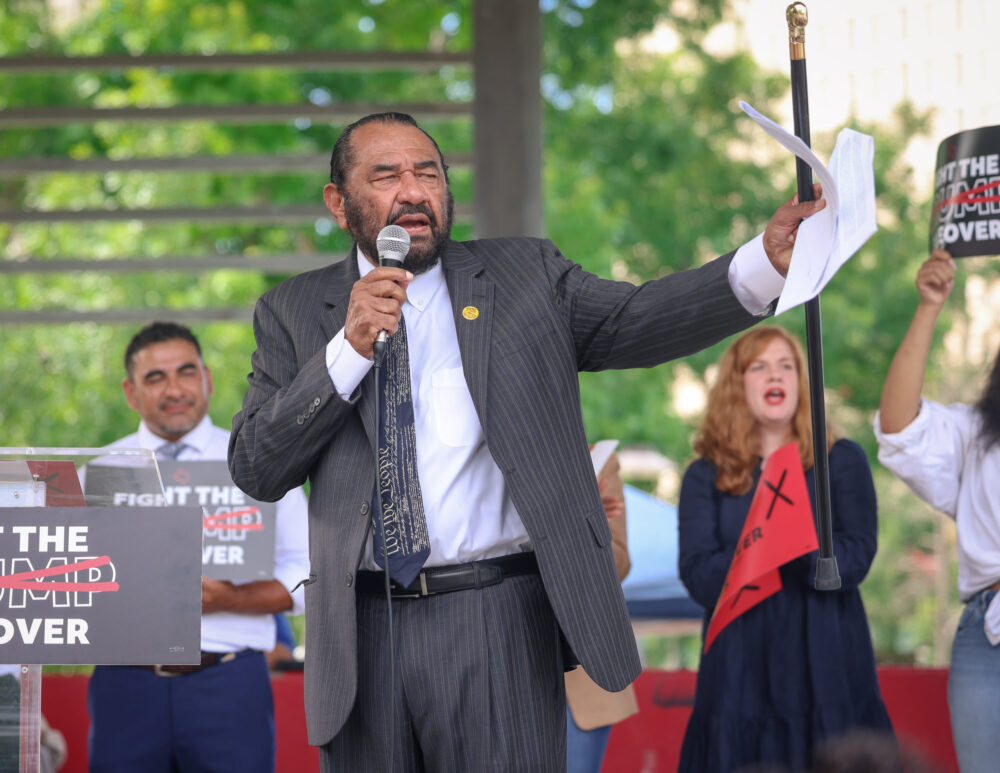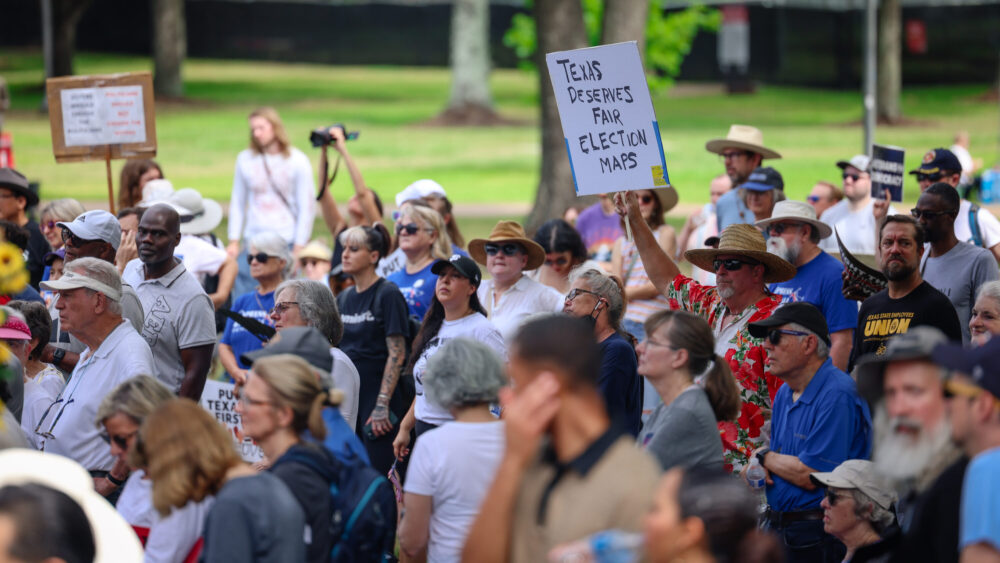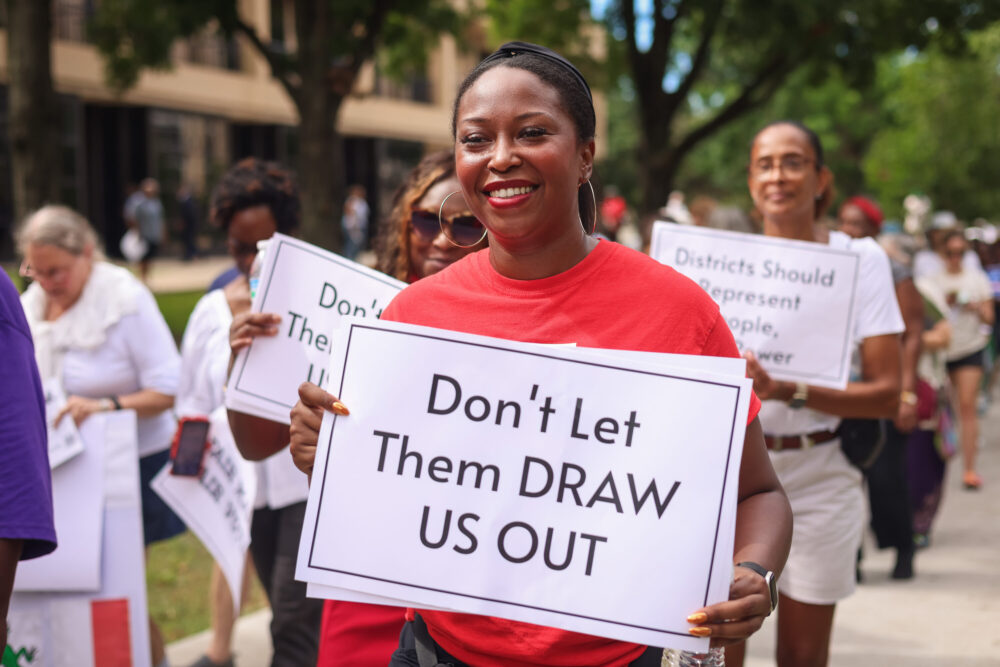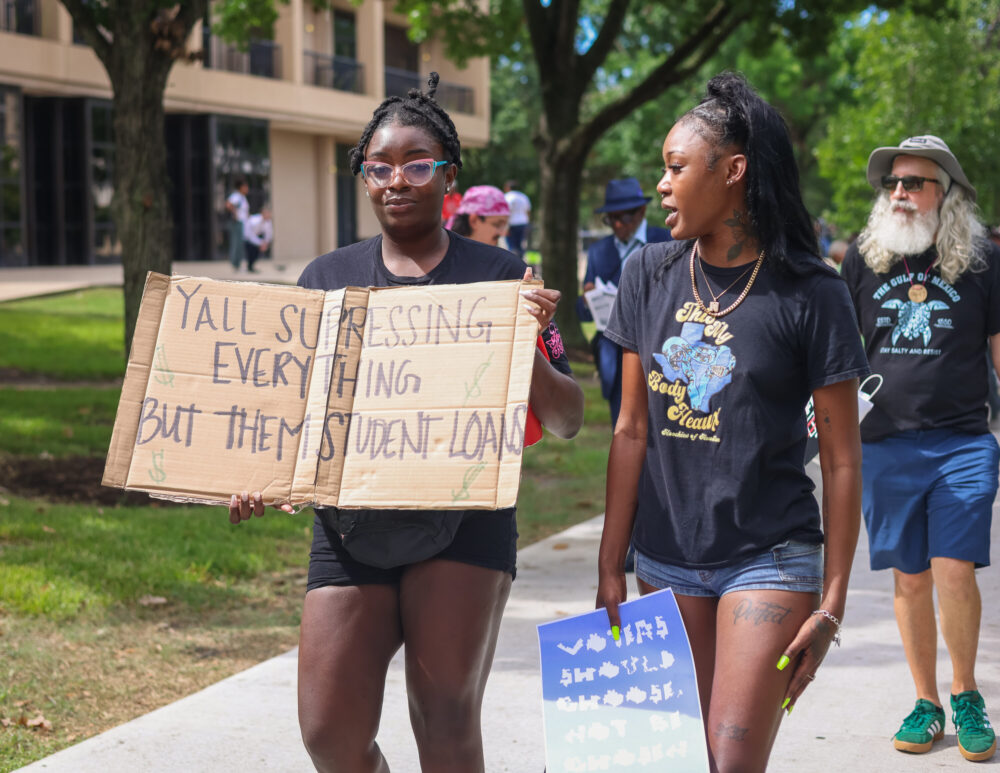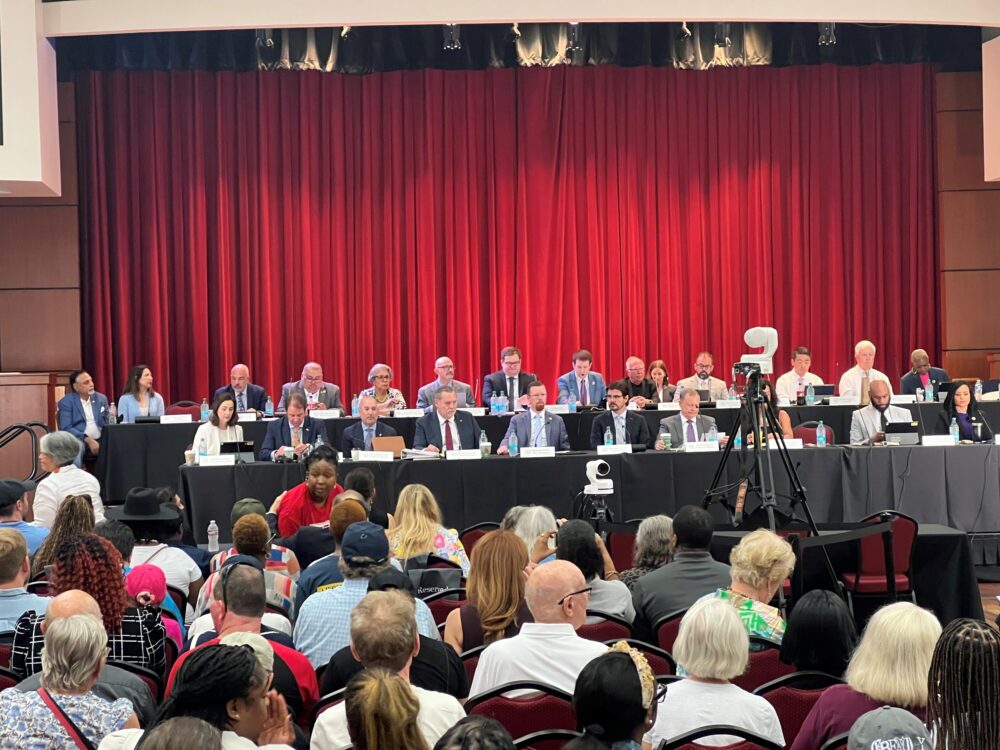Texas state lawmakers gathered at the University of Houston on Saturday to hear public testimony on Texas’ mid-decade round of congressional redistricting. Much of the attention focused on the congressional district where the hearing took place, Texas’ 18th, which has been vacant most of the past year.
President Donald Trump has said he wants Texas to redistrict so the GOP can pick up five congressional seats next year. Republican state lawmakers have yet to unveil any proposed map. That they have yet to do so was a major point of contention at Saturday’s hearings, where many witnesses questioned why the committee was taking testimony when no one could say what boundaries were being proposed. State Rep. Cody Vasut (R-Angleton), the committee chair, repeatedly said the committee was acting at the behest of Gov. Greg Abbott, who had put congressional redistricting on the special session call.
The hearings opened with a group of Democratic members of Congress speaking up to oppose redistricting, including U.S. Reps. Sylvia Garcia (TX-29), Lizzie Fletcher (TX-7), Jasmine Crockett (TX-30), and Al Green (TX-9) – as well as former Democratic U.S. Rep. Nick Lampson.
Garcia and Green represent two of the four congressional districts that were targeted for redrawing in a letter to Abbot from the U.S. Department of Justice’s Civil Rights Division. The letter alleged that four Texas congressional districts, three of which are represented by people of color and all of which contained majority non-white voting populations, amounted to “unconstitutional racial gerrymanders.”
The letter also identified Texas’ 33rd District, which stretches from Dallas to Fort Worth, whose congressman, Democratic U.S. Rep. Marc Veasey, did not attend the hearing.
The fourth district, Texas’ 18th, encompasses much of downtown Houston and portions of Harris County. It has been represented by a series of Black Democratic members of Congress from 1973 through earlier this year. This past Saturday, however, the 18th Congressional District had no member of its own to speak for it.
‘Nobody’s there to vote for our district’
“District 18 has made a difference,” Green told the House Select Committee on Congressional Redistricting when it met at the University of Houston’s Student Center South. “When we had the vote on this big, ugly steal of a bill [President Trump’s signature budget package], it passed by one vote. One vote. If the 18th Congressional District had been represented, it would not have passed with those votes.”
The district’s long-time U.S. representative, Congresswoman Sheila Jackson Lee, died in office over a year ago, leaving it open for months. Congressman Sylvester Turner, who won the seat last November, died in March. Governor Abbott declined to call a special election to fill out Turner’s term until this coming November.
“That means that when there are votes on the floor, nobody’s there to vote for our district,” said acting Harris County Attorney Christian Menefee, a Democratic candidate for the 18th Congressional District
Menefee spelled out the consequences of the district not having a say on critical issues concerning district residents, and he called on members of the redistricting committee to resist pressure to redraw the district’s boundaries to weaken its residents’ voices further.
“That means that when immigrants and veterans need their cases work, nobody’s here to do that work. That means that when SNAP benefits and Medicaid are cut, there is no voice for this district,” Menefee said. “Do not strip these folks of their political power. Do not adopt a redistricting plan that does that.”
Former Houston City Council Member Amanda Edwards, who is also running for the seat as a Democrat, said that by the time voters in the 18th get a new member of Congress, the district will have been unrepresented for well over a year.
“There’s an adage that goes like this, ‘If you’re not at the table, you’re what’s on the menu.’ And right now, with this hearing, with this special session to seek redistricting, we are placing the 800,000 people of the 18th Congressional District on the menu,” Edwards said. “That’s unconscionable. That’s unacceptable.”
Accusations of racial discrimination in redistricting
A third Democratic candidate for the 18th District, State Representative Jolanda Jones, who sat on the dais alongside members of the committee, frequently criticized the redistricting process as racially discriminatory while questioning witnesses.
“They crack the minority areas, and then they put a small number of minorities in a district with people who look nothing like them, and that’s how they’re able to hijack, to terrorize, to kidnap the United States Congress,” Jones said. “It’s just not right.”
Several witnesses pointed out that, while Black, Hispanic, and Asian population growth accounted for virtually all of Texas’s population growth in the decade leading up to the last census, non-Hispanic white residents still controlled a large majority of the state’s congressional districts.
“Redistricting should be about ensuring that every Texan, regardless of race, zip code or party, has access to equal power,” said Zoe Cadore, another Democratic candidate running to represent the 18th Congressional District. “But too often, it becomes a tool to preserve power instead of sharing it. And the people who pay the price are communities like mine, Black, brown, immigrant, working-class Texans who are more than just voting blocks.”
Robert Slater, a former staffer to the late Rep. Jackson Lee, is another candidate aspiring to the mantle of his mentor. While others had implored the committee to do what they considered the right thing by not dramatically redrawing the 18th District’s boundaries, Slater told the committee he was under no illusions about how the committee’s Republican majority would likely act.
“Respectfully, I do believe that it’s not about what we’re saying, but what is not being said here,” Slater said. “I do believe that this hearing is a mere notion for future legal challenges, if you will, so you can say that you have the input of the community.”
One other Democratic candidate for the 18th District who spoke, introduced one of the few moments of levity into the proceedings. Isaiah Martin had been arrested at the Capitol at last Thursday’s House redistricting hearing, after he refused to yield the microphone when his time to speak had expired. He was subsequently released and the charges dropped.
“I’m Isaiah Martin, and as I was saying…” he began to laughter from the spectators. “You Republicans tried so hard to silence me. You had me thrown in jail, and I wanted to come here to look every single one of you in the eye and let you know personally that you failed.”
One of the most impassioned pleas for Republicans to hold off from pushing through a redrawing of the congressional maps came from Bill Kelly, a former staffer to Sylvester Turner during Turner’s two terms as mayor of Houston. Kelly called out several Republican members of the committee who had served alongside then-state Rep. Turner in the Texas Legislature for decades.
“You were his friends — not his work colleagues, his friends,” Kelly said. “Tearing apart minority districts is wrong and certainly something that your friend Sylvester Turner would speak against. I ask you, his friends, to stop.”
A countervailing argument
One of the main points of dispute between the Trump administration and Democrats in their arguments over redistricting is the legality of coalition districts — that is, districts that are designed to elect candidates representing coalitions of non-white voters. Such districts can help non-white voters elect a candidate of their choice, particularly when neither Black nor Hispanic residents can command an outright majority but together they outnumber non-Hispanic whites.
The question of whether such districts are legal was at the center of a recent lawsuit involving county-level redistricting in Galveston County. The Republican-led county government asserted that coalition districts are not protected under the 1965 Voting Rights Act. Civil rights organizations representing Black and Hispanic residents disagreed. A federal district court initially upheld the Black and Hispanic groups’ claims, but the U.S. 5th Circuit Court of Appeals reversed the ruling. The Trump administration and Gov. Abbott appear to be basing their arguments for redistricting on that appeals court decision.
The argument for coalition districts hinges on the different racial or ethnic groups in a coalition having common political interests. But not everyone agrees they do.
Carmen Maria Montiel is a Republican candidate for the 18th District. She previously challenged Sheila Jackson Lee and lost overwhelmingly in 2022. Montiel was the one person to testify before the House committee who openly supported redistricting. She argued that the 18th District, which has long elected Black Democrats, no longer represents the majority of its residents.
“For example, District 18 became majority Latino, with 45%, after the census in 2020. However, it has been impossible to change the representation of the district, and the same faces do nothing,” Montiel said. “The few, and very few, people that represent Latinos in this town do not represent our values.”
Great Job & the Team @ Houston Public Media Source link for sharing this story.


